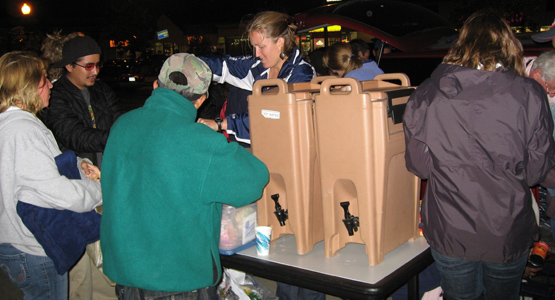MED Students Take Pulse of East Boston’s Homeless
Revisiting the community: Van program nets grant for mental health care

The ways Boston University students reach into the community around us are an ongoing source of fascination — and good journalism. These connections and collaborations might at first glance seem to be one-way streets, but as each of the stories from the past school year we’re highlighting this week reveals, give and take, offering and receiving, are intimately linked.
Every Thursday at 7 p.m., a white van leaves the Boston University Medical Campus and makes its way to East Boston loaded with food, clothing, blankets, toiletries, and health pamphlets. On board are students from the Schools of Dental Medicine, Medicine, Public Health, and Social Work, as well as a licensed physician. For the rest of the evening, the team treats what ails Eastie’s homeless and indigent. And thanks to a $5,000 grant from the American Psychiatric Foundation, they’ll soon tackle the mental health issues that underlie many of their day-to-day tribulations.
“The majority of our clients have some form of a mental health condition,” says Matt Gonzalez (MED’12), one of the two coordinators of the Outreach Van Project (OPV). “I would argue it’s the most critical component that we can address. We can give them food and clothing and refer them to a doctor for minor medical issues or colds, but the underlying major cause of their dire situation cannot be corrected unless their mental health improves.”
The APF grant, along with a $15,000 grant from the Tufts Health Plan Foundation, will help recruit mental health workers and increase public awareness of homelessness in Boston. Most important, says Jane Yoon (MED’09), OPV’s other coordinator, it will help cover the cost of transportation for crucial follow-up care.
“Many times, after we give a referral or ask patients if they’d like to make an appointment with a doctor at Boston Medical Center, they tell us that they have no way of getting there or they can’t afford to waste money on transportation,” Yoon says. “These grants allow us to purchase taxi and bus vouchers so they have a better chance of keeping follow-up appointments after meeting with our on-site physician or mental health professional.”
MED’s Outreach Van Project, begun in 1997 by a group of BU medical and public health students, gives students a chance to get into the field and roll up their sleeves. Parked at the edge of East Boston’s Central Park, the van serves about 25 people each week. Volunteers chat up people on the streets, connect them with community services, and provide health education. Depending on their training, students also take blood pressure, document health histories, and attend to basic medical needs under the supervision of a physician.
The van project has also in recent years served street populations in Cambridge and Somerville, as well as at the Suffolk Downs racetrack, where migrants from Mexico and Central America often find low-paying work. But like many recent immigrants to East Boston, some also bring with them substance abuse and mental health problems. Some have witnessed war crimes and human-rights abuses. “We have established a solid foundation of trust with our clients by making sure to show up every Thursday no matter how bad the weather,” Gonzalez says. “Because of this, they are more than willing to open up to us with their emotional problems from their stressful lives.”
“OVP is a great way for students to get comfortable talking to patients about sensitive issues such as alcohol abuse, drug abuse, addiction, bipolar disorder, schizophrenia, depression, and high anxiety,” he says. “It’s also a great way to get a better feel for the needs of the underserved and homeless populations in Boston, so that we can further assist them in the future and be active leaders in fighting for policies that will improve their access and quality of health care.”
The Outreach Van Project is funded by a collection of private and public agencies, including the Massachusetts Medical Society, the Boston Evening Clinic Foundation, the Greater Boston Food Bank, and private donors, as well as several MED graduating classes.
Caleb Daniloff can be reached at cdanilof@bu.edu.
This story originally ran February 23, 2009.
Comments & Discussion
Boston University moderates comments to facilitate an informed, substantive, civil conversation. Abusive, profane, self-promotional, misleading, incoherent or off-topic comments will be rejected. Moderators are staffed during regular business hours (EST) and can only accept comments written in English. Statistics or facts must include a citation or a link to the citation.